-
EXECUTIVE SUMMARY
-
MARKET INTRODUCTION
-
DEFINITION
-
SCOPE OF THE STUDY
-
RESEARCH OBJECTIVE
-
MARKET STRUCTURE
-
RESEARCH METHODOLOGY
-
OVERVIEW
-
DATA FLOW
- DATA MINING PROCESS
-
PURCHASED DATABASE:
-
SECONDARY SOURCES:
- SECONDARY RESEARCH DATA FLOW:
-
PRIMARY RESEARCH:
- PRIMARY RESEARCH DATA FLOW:
- PRIMARY RESEARCH: NUMBER OF INTERVIEWS CONDUCTED
- PRIMARY RESEARCH: REGIONAL COVERAGE
-
APPROACHES FOR MARKET SIZE ESTIMATION:
- REVENUE ANALYSIS APPROACH
-
DATA FORECASTING
- DATA FORECASTING TECHNIQUE
-
DATA MODELING
- MICROECONOMIC FACTOR ANALYSIS:
- DATA MODELING:
-
TEAMS AND ANALYST CONTRIBUTION
-
MARKET DYNAMICS
-
INTRODUCTION
-
DRIVERS
- RISING DEMAND FOR PREMIUM AND ARTISANAL CHOCOLATE
- GROWTH OF THE COMPOUND CHOCOLATE SEGMENT
- EXPANDING MIDDLE-CLASS AND URBANIZATION IN EMERGING ECONOMIES
- DRIVER IMPACT ANALYSIS
-
RESTRAINTS
- VOLATILITY IN COCOA PRICES
- HEALTH CONCERNS AND NEGATIVE PERCEPTIONS
- COMPETITION FROM ALTERNATIVE SNACKS
- RESTRAINT IMPACT ANALYSIS
-
OPPORTUNITY
- HEALTH-FOCUSED INNOVATION
- RISING DEMAND FOR PREMIUM AND ORIGIN-SPECIFIC CHOCOLATE
- E-COMMERCE AND DIRECT-TO-CONSUMER (D2C) GROWTH
-
IMPACT ANALYSIS OF COVID-19
- IMPACT ON OVERALL FOOD & BEVERAGE INDUSTRY
- IMPACT ON GLOBAL REAL & COMPOUND CHOCOLATE MARKET
- IMPACT ON SUPPLY CHAIN OF REAL & COMPOUND CHOCOLATE MARKET
- IMPACT ON MARKET DEMAND OF REAL & COMPOUND CHOCOLATE MARKET
- IMPACT ON PRICING ON REAL & COMPOUND CHOCOLATE MARKET
-
MARKET FACTOR ANALYSIS
-
SUPPLY CHAIN ANALYSIS
- RAW MATERIAL
- MANUFACTURING
- DISTRIBUTORS
- END USER
-
PORTER’S FIVE FORCES MODEL
- THREAT OF NEW ENTRANTS (MODERATE)
- BARGAINING POWER OF SUPPLIERS (MODERATE)
- THREAT OF SUBSTITUTES (HIGH)
- BARGAINING POWER OF BUYERS (HIGH)
- COMPETITION RIVALRY (VERY HIGH)
-
REGULATORY FRAMEWORK
-
MARKET TRENDS
- PREMIUMIZATION & ARTISANAL CHOCOLATE SURGE
- HEALTH-CONSCIOUS AND FUNCTIONAL CHOCOLATES
- CLEAN LABEL AND SUSTAINABLE SOURCING
- RISING POPULARITY OF COMPOUND CHOCOLATE IN DEVELOPING REGIONS
- PLANT-BASED AND DAIRY-FREE INNOVATIONS
- E-COMMERCE AND DIRECT-TO-CONSUMER (D2C) BOOM
- INNOVATIVE FORMATS AND FLAVORS
- ETHICAL AND TRANSPARENT BRANDING
- RISE OF GIFTING & SEASONAL DEMAND
- INDUSTRIAL & FOODSERVICE GROWTH
-
CONSUMER BEHAVIOUR ANALYSIS
-
STRATEGIC INSIGHTS
-
GLOBAL REAL & COMPOUND CHOCOLATE MARKET, BY TYPE
-
INTRODUCTION
-
REAL CHOCOLATE
-
COMPOUND CHOCOLATE
-
GLOBAL REAL & COMPOUND CHOCOLATE MARKET, BY PRODUCT TYPE
-
INTRODUCTION
-
MILK CHOCOLATE
-
DARK CHOCOLATE
-
WHITE CHOCOLATE
-
RUBY CHOCOLATE
-
COUVERTURE CHOCOLATE
-
GLOBAL REAL & COMPOUND CHOCOLATE MARKET, BY APPLICATION
-
INTRODUCTION
-
CONFECTIONARY & SWEETS
-
BAKERY & PASTRIES
-
BEVERAGES
-
ICE CREAM & DESSERTS
-
DAIRY & YOGURT PRODUCTS
-
BREAKFAST CEREALS & SPREADS
-
NUTRITIONAL & FUNCTIONAL PRODUCTS
-
FOODSERVICE INDUSTRY
-
GLOBAL REAL & COMPOUND CHOCOLATE MARKET, BY COCOA CONTENT
-
INTRODUCTION
-
LOW COCOA CONTENT (BELOW 50%)
-
MEDIUM COCOA CONTENT (50%-70%)
-
HIGH COCOA CONTENT (ABOVE 70%)
-
GLOBAL REAL & COMPOUND CHOCOLATE MARKET, BY FORM & FORMAT
-
INTRODUCTION
-
BARS & TABLETS
-
CHIPS & CHUNKS
-
POWDERED COCOA & DRINKING CHOCOLATE
-
COATINGS & FILLINGS
-
LIQUID CHOCOLATE & SYRUPS
-
GLOBAL REAL & COMPOUND CHOCOLATE MARKET, BY DISTRIBUTION CHANNEL
-
INTRODUCTION
-
SUPERMARKETS & HYPERMARKETS
-
CONVENIENCE STORES
-
ONLINE RETAIL
-
SPECIALTY STORES & BOUTIQUES
-
GLOBAL REAL & COMPOUND CHOCOLATE MARKET, BY REGION
-
OVERVIEW
-
NORTH AMERICA
- U.S.
- CANADA
-
EUROPE
- GERMANY
- UK
- FRANCE
- RUSSIA
- ITALY
- SPAIN
- REST OF EUROPE
-
ASIA-PACIFIC
- CHINA
- INDIA
- JAPAN
- SOUTH KOREA
- MALAYSIA
- THAILAND
- INDONESIA
- REST OF ASIA-PACIFIC
-
SOUTH AMERICA
- BRAZIL
- MEXICO
- ARGENTINA
- REST OF SOUTH AMERICA
-
MIDDLE EAST & AFRICA (MEA)
- GCC COUNTRIES
- SOUTH AFRICA
- REST OF MEA
-
COMPETITIVE LANDSCAPE
-
INTRODUCTION
-
MARKET SHARE ANALYSIS, 2024
-
COMPETITOR DASHBOARD
-
KEY DEVELOPMENTS & GROWTH STRATEGIES
- PRODUCT LAUNCH
- ACQUISITION
-
COMPANY PROFILES
-
BARRY CALLEBAUT
- COMPANY OVERVIEW
- FINANCIAL OVERVIEW
- PRODUCTS OFFERED
- KEY DEVELOPMENTS
- SWOT ANALYSIS
- KEY STRATEGIES
-
LINDT & SPRÜNGLI
- COMPANY OVERVIEW
- FINANCIAL OVERVIEW
- PRODUCTS OFFERED
- KEY DEVELOPMENTS
- SWOT ANALYSIS
- KEY STRATEGIES
-
FERRERO GROUP
- COMPANY OVERVIEW
- FINANCIAL OVERVIEW
- PRODUCTS OFFERED
- KEY DEVELOPMENTS
- SWOT ANALYSIS
- KEY STRATEGIES
-
MARS, INCORPORATED
- COMPANY OVERVIEW
- FINANCIAL OVERVIEW
- PRODUCTS OFFERED
- KEY DEVELOPMENTS
- SWOT ANALYSIS
- KEY STRATEGIES
-
HERSHEY'S
- COMPANY OVERVIEW
- FINANCIAL OVERVIEW
- PRODUCTS OFFERED
- KEY DEVELOPMENTS
- SWOT ANALYSIS
- KEY STRATEGIES
-
MONDELEZ INTERNATIONAL
- COMPANY OVERVIEW
- FINANCIAL OVERVIEW
- PRODUCTS OFFERED
- KEY DEVELOPMENTS
- SWOT ANALYSIS
- KEY STRATEGIES
-
NESTLE
- COMPANY OVERVIEW
- FINANCIAL OVERVIEW
- PRODUCTS OFFERED
- KEY DEVELOPMENTS
- SWOT ANALYSIS
- KEY STRATEGIES
-
CARGILL
- COMPANY OVERVIEW
- FINANCIAL OVERVIEW
- PRODUCTS OFFERED
- KEY DEVELOPMENTS
- SWOT ANALYSIS
- KEY STRATEGIES
-
FUJI OIL CO., LTD
- COMPANY OVERVIEW
- FINANCIAL OVERVIEW
- PRODUCTS OFFERED
- KEY DEVELOPMENTS
- SWOT ANALYSIS
- KEY STRATEGIES
-
PURATOS
- COMPANY OVERVIEW
- FINANCIAL OVERVIEW
- PRODUCTS OFFERED
- KEY DEVELOPMENTS
- SWOT ANALYSIS
- KEY STRATEGIES
-
-
LIST OF TABLES
-
QFD MODELING FOR MARKET SHARE ASSESSMENT
-
GLOBAL REAL & COMPOUND CHOCOLATE MARKET, BY TYPE, 2019-2035 (USD MILLION)
-
GLOBAL REAL & COMPOUND CHOCOLATE MARKET, BY PRODUCT TYPE, 2019-2035 (USD MILLION)
-
GLOBAL REAL & COMPOUND CHOCOLATE MARKET, BY APPLICATION, 2019-2035 (USD MILLION)
-
GLOBAL REAL & COMPOUND CHOCOLATE MARKET, BY COCOA CONTENT, 2019-2035 (USD MILLION)
-
GLOBAL REAL & COMPOUND CHOCOLATE MARKET, BY FORM & FORMAT, 2019-2035 (USD MILLION)
-
GLOBAL REAL & COMPOUND CHOCOLATE MARKET, BY DISTRIBUTION CHANNEL, 2019-2035 (USD MILLION)
-
GLOBAL REAL & COMPOUND CHOCOLATE MARKET, BY REGION, 2019-2035 (USD MILLION)
-
NORTH AMERICA: REAL & COMPOUND CHOCOLATE MARKET, BY COUNTRY, 2019-2035 (USD MILLION)
-
NORTH AMERICA: REAL & COMPOUND CHOCOLATE MARKET, BY TYPE, 2019-2035 (USD MILLION)
-
NORTH AMERICA: REAL & COMPOUND CHOCOLATE MARKET, BY PRODUCT TYPE, 2019-2035 (USD MILLION)
-
NORTH AMERICA: REAL & COMPOUND CHOCOLATE MARKET, BY APPLICATION, 2019-2035 (USD MILLION)
-
NORTH AMERICA: REAL & COMPOUND CHOCOLATE MARKET, BY COCOA CONTENT, 2019-2035 (USD MILLION)
-
NORTH AMERICA: REAL & COMPOUND CHOCOLATE MARKET, BY FORM & FORMAT, 2019-2035 (USD MILLION)
-
NORTH AMERICA: REAL & COMPOUND CHOCOLATE MARKET, BY DISTRIBUTION CHANNEL, 2019-2035 (USD MILLION)
-
U.S.: REAL & COMPOUND CHOCOLATE MARKET, BY TYPE, 2019-2035 (USD MILLION)
-
U.S.: REAL & COMPOUND CHOCOLATE MARKET, BY PRODUCT TYPE, 2019-2035 (USD MILLION)
-
U.S.: REAL & COMPOUND CHOCOLATE MARKET, BY APPLICATION, 2019-2035 (USD MILLION)
-
U.S.: REAL & COMPOUND CHOCOLATE MARKET, BY COCOA CONTENT, 2019-2035 (USD MILLION)
-
U.S.: REAL & COMPOUND CHOCOLATE MARKET, BY FORM & FORMAT, 2019-2035 (USD MILLION)
-
U.S.: REAL & COMPOUND CHOCOLATE MARKET, BY DISTRIBUTION CHANNEL, 2019-2035 (USD MILLION)
-
CANADA: REAL & COMPOUND CHOCOLATE MARKET, BY TYPE, 2019-2035 (USD MILLION)
-
CANADA: REAL & COMPOUND CHOCOLATE MARKET, BY PRODUCT TYPE, 2019-2035 (USD MILLION)
-
CANADA: REAL & COMPOUND CHOCOLATE MARKET, BY APPLICATION, 2019-2035 (USD MILLION)
-
CANADA: REAL & COMPOUND CHOCOLATE MARKET, BY COCOA CONTENT, 2019-2035 (USD MILLION)
-
CANADA: REAL & COMPOUND CHOCOLATE MARKET, BY FORM & FORMAT, 2019-2035 (USD MILLION)
-
CANADA: REAL & COMPOUND CHOCOLATE MARKET, BY DISTRIBUTION CHANNEL, 2019-2035 (USD MILLION)
-
EUROPE: REAL & COMPOUND CHOCOLATE MARKET, BY COUNTRY, 2019-2035 (USD MILLION)
-
EUROPE: REAL & COMPOUND CHOCOLATE MARKET, BY TYPE, 2019-2035 (USD MILLION)
-
EUROPE: REAL & COMPOUND CHOCOLATE MARKET, BY PRODUCT TYPE, 2019-2035 (USD MILLION)
-
EUROPE: REAL & COMPOUND CHOCOLATE MARKET, BY APPLICATION, 2019-2035 (USD MILLION)
-
EUROPE: REAL & COMPOUND CHOCOLATE MARKET, BY COCOA CONTENT, 2019-2035 (USD MILLION)
-
EUROPE: REAL & COMPOUND CHOCOLATE MARKET, BY FORM & FORMAT, 2019-2035 (USD MILLION)
-
EUROPE: REAL & COMPOUND CHOCOLATE MARKET, BY DISTRIBUTION CHANNEL, 2019-2035 (USD MILLION)
-
GERMANY: REAL & COMPOUND CHOCOLATE MARKET, BY TYPE, 2019-2035 (USD MILLION)
-
GERMANY: REAL & COMPOUND CHOCOLATE MARKET, BY PRODUCT TYPE, 2019-2035 (USD MILLION)
-
GERMANY: REAL & COMPOUND CHOCOLATE MARKET, BY APPLICATION, 2019-2035 (USD MILLION)
-
GERMANY: REAL & COMPOUND CHOCOLATE MARKET, BY COCOA CONTENT, 2019-2035 (USD MILLION)
-
GERMANY: REAL & COMPOUND CHOCOLATE MARKET, BY FORM & FORMAT, 2019-2035 (USD MILLION)
-
GERMANY: REAL & COMPOUND CHOCOLATE MARKET, BY DISTRIBUTION CHANNEL, 2019-2035 (USD MILLION)
-
UK: REAL & COMPOUND CHOCOLATE MARKET, BY TYPE, 2019-2035 (USD MILLION)
-
UK: REAL & COMPOUND CHOCOLATE MARKET, BY PRODUCT TYPE, 2019-2035 (USD MILLION)
-
UK: REAL & COMPOUND CHOCOLATE MARKET, BY APPLICATION, 2019-2035 (USD MILLION)
-
UK: REAL & COMPOUND CHOCOLATE MARKET, BY COCOA CONTENT, 2019-2035 (USD MILLION)
-
UK: REAL & COMPOUND CHOCOLATE MARKET, BY FORM & FORMAT, 2019-2035 (USD MILLION)
-
UK: REAL & COMPOUND CHOCOLATE MARKET, BY DISTRIBUTION CHANNEL, 2019-2035 (USD MILLION)
-
FRANCE: REAL & COMPOUND CHOCOLATE MARKET, BY TYPE, 2019-2035 (USD MILLION)
-
FRANCE: REAL & COMPOUND CHOCOLATE MARKET, BY PRODUCT TYPE, 2019-2035 (USD MILLION)
-
FRANCE: REAL & COMPOUND CHOCOLATE MARKET, BY APPLICATION, 2019-2035 (USD MILLION)
-
FRANCE: REAL & COMPOUND CHOCOLATE MARKET, BY COCOA CONTENT, 2019-2035 (USD MILLION)
-
FRANCE: REAL & COMPOUND CHOCOLATE MARKET, BY FORM & FORMAT, 2019-2035 (USD MILLION)
-
FRANCE: REAL & COMPOUND CHOCOLATE MARKET, BY DISTRIBUTION CHANNEL, 2019-2035 (USD MILLION)
-
RUSSIA: REAL & COMPOUND CHOCOLATE MARKET, BY TYPE, 2019-2035 (USD MILLION)
-
RUSSIA: REAL & COMPOUND CHOCOLATE MARKET, BY PRODUCT TYPE, 2019-2035 (USD MILLION)
-
RUSSIA: REAL & COMPOUND CHOCOLATE MARKET, BY APPLICATION, 2019-2035 (USD MILLION)
-
RUSSIA: REAL & COMPOUND CHOCOLATE MARKET, BY COCOA CONTENT, 2019-2035 (USD MILLION)
-
RUSSIA: REAL & COMPOUND CHOCOLATE MARKET, BY FORM & FORMAT, 2019-2035 (USD MILLION)
-
RUSSIA: REAL & COMPOUND CHOCOLATE MARKET, BY DISTRIBUTION CHANNEL, 2019-2035 (USD MILLION)
-
ITALY: REAL & COMPOUND CHOCOLATE MARKET, BY TYPE, 2019-2035 (USD MILLION)
-
ITALY: REAL & COMPOUND CHOCOLATE MARKET, BY PRODUCT TYPE, 2019-2035 (USD MILLION)
-
ITALY: REAL & COMPOUND CHOCOLATE MARKET, BY APPLICATION, 2019-2035 (USD MILLION)
-
ITALY: REAL & COMPOUND CHOCOLATE MARKET, BY COCOA CONTENT, 2019-2035 (USD MILLION)
-
ITALY: REAL & COMPOUND CHOCOLATE MARKET, BY FORM & FORMAT, 2019-2035 (USD MILLION)
-
ITALY: REAL & COMPOUND CHOCOLATE MARKET, BY DISTRIBUTION CHANNEL, 2019-2035 (USD MILLION)
-
SPAIN: REAL & COMPOUND CHOCOLATE MARKET, BY TYPE, 2019-2035 (USD MILLION)
-
SPAIN: REAL & COMPOUND CHOCOLATE MARKET, BY PRODUCT TYPE, 2019-2035 (USD MILLION)
-
SPAIN: REAL & COMPOUND CHOCOLATE MARKET, BY APPLICATION, 2019-2035 (USD MILLION)
-
SPAIN: REAL & COMPOUND CHOCOLATE MARKET, BY COCOA CONTENT, 2019-2035 (USD MILLION)
-
SPAIN: REAL & COMPOUND CHOCOLATE MARKET, BY FORM & FORMAT, 2019-2035 (USD MILLION)
-
SPAIN: REAL & COMPOUND CHOCOLATE MARKET, BY DISTRIBUTION CHANNEL, 2019-2035 (USD MILLION)
-
REST OF EUROPE: REAL & COMPOUND CHOCOLATE MARKET, BY TYPE, 2019-2035 (USD MILLION)
-
REST OF EUROPE: REAL & COMPOUND CHOCOLATE MARKET, BY PRODUCT TYPE, 2019-2035 (USD MILLION)
-
REST OF EUROPE: REAL & COMPOUND CHOCOLATE MARKET, BY APPLICATION, 2019-2035 (USD MILLION)
-
REST OF EUROPE: REAL & COMPOUND CHOCOLATE MARKET, BY COCOA CONTENT, 2019-2035 (USD MILLION)
-
REST OF EUROPE: REAL & COMPOUND CHOCOLATE MARKET, BY FORM & FORMAT, 2019-2035 (USD MILLION)
-
REST OF EUROPE: REAL & COMPOUND CHOCOLATE MARKET, BY DISTRIBUTION CHANNEL, 2019-2035 (USD MILLION)
-
ASIA-PACIFIC: REAL & COMPOUND CHOCOLATE MARKET, BY COUNTRY, 2019-2035 (USD MILLION)
-
ASIA PACIFIC: REAL & COMPOUND CHOCOLATE MARKET, BY TYPE, 2019-2035 (USD MILLION)
-
ASIA PACIFIC: REAL & COMPOUND CHOCOLATE MARKET, BY PRODUCT TYPE, 2019-2035 (USD MILLION)
-
ASIA PACIFIC: REAL & COMPOUND CHOCOLATE MARKET, BY APPLICATION, 2019-2035 (USD MILLION)
-
ASIA PACIFIC: REAL & COMPOUND CHOCOLATE MARKET, BY COCOA CONTENT, 2019-2035 (USD MILLION)
-
ASIA PACIFIC: REAL & COMPOUND CHOCOLATE MARKET, BY FORM & FORMAT, 2019-2035 (USD MILLION)
-
ASIA PACIFIC: REAL & COMPOUND CHOCOLATE MARKET, BY DISTRIBUTION CHANNEL, 2019-2035 (USD MILLION)
-
CHINA: REAL & COMPOUND CHOCOLATE MARKET, BY TYPE, 2019-2035 (USD MILLION)
-
CHINA: REAL & COMPOUND CHOCOLATE MARKET, BY PRODUCT TYPE, 2019-2035 (USD MILLION)
-
CHINA: REAL & COMPOUND CHOCOLATE MARKET, BY APPLICATION, 2019-2035 (USD MILLION)
-
CHINA: REAL & COMPOUND CHOCOLATE MARKET, BY COCOA CONTENT, 2019-2035 (USD MILLION)
-
CHINA: REAL & COMPOUND CHOCOLATE MARKET, BY FORM & FORMAT, 2019-2035 (USD MILLION)
-
CHINA: REAL & COMPOUND CHOCOLATE MARKET, BY DISTRIBUTION CHANNEL, 2019-2035 (USD MILLION)
-
INDIA: REAL & COMPOUND CHOCOLATE MARKET, BY TYPE, 2019-2035 (USD MILLION)
-
INDIA: REAL & COMPOUND CHOCOLATE MARKET, BY PRODUCT TYPE, 2019-2035 (USD MILLION)
-
INDIA: REAL & COMPOUND CHOCOLATE MARKET, BY APPLICATION, 2019-2035 (USD MILLION)
-
INDIA: REAL & COMPOUND CHOCOLATE MARKET, BY COCOA CONTENT, 2019-2035 (USD MILLION)
-
INDIA: REAL & COMPOUND CHOCOLATE MARKET, BY FORM & FORMAT, 2019-2035 (USD MILLION)
-
INDIA: REAL & COMPOUND CHOCOLATE MARKET, BY DISTRIBUTION CHANNEL, 2019-2035 (USD MILLION)
-
JAPAN: REAL & COMPOUND CHOCOLATE MARKET, BY TYPE, 2019-2035 (USD MILLION)
-
JAPAN: REAL & COMPOUND CHOCOLATE MARKET, BY PRODUCT TYPE, 2019-2035 (USD MILLION)
-
JAPAN: REAL & COMPOUND CHOCOLATE MARKET, BY APPLICATION, 2019-2035 (USD MILLION)
-
JAPAN: REAL & COMPOUND CHOCOLATE MARKET, BY COCOA CONTENT, 2019-2035 (USD MILLION)
-
JAPAN: REAL & COMPOUND CHOCOLATE MARKET, BY FORM & FORMAT, 2019-2035 (USD MILLION)
-
JAPAN: REAL & COMPOUND CHOCOLATE MARKET, BY DISTRIBUTION CHANNEL, 2019-2035 (USD MILLION)
-
SOUTH KOREA: REAL & COMPOUND CHOCOLATE MARKET, BY TYPE, 2019-2035 (USD MILLION)
-
SOUTH KOREA: REAL & COMPOUND CHOCOLATE MARKET, BY PRODUCT TYPE, 2019-2035 (USD MILLION)
-
SOUTH KOREA: REAL & COMPOUND CHOCOLATE MARKET, BY APPLICATION, 2019-2035 (USD MILLION)
-
SOUTH KOREA: REAL & COMPOUND CHOCOLATE MARKET, BY COCOA CONTENT, 2019-2035 (USD MILLION)
-
SOUTH KOREA: REAL & COMPOUND CHOCOLATE MARKET, BY FORM & FORMAT, 2019-2035 (USD MILLION)
-
SOUTH KOREA: REAL & COMPOUND CHOCOLATE MARKET, BY DISTRIBUTION CHANNEL, 2019-2035 (USD MILLION)
-
MALAYSIA: REAL & COMPOUND CHOCOLATE MARKET, BY TYPE, 2019-2035 (USD MILLION)
-
MALAYSIA: REAL & COMPOUND CHOCOLATE MARKET, BY PRODUCT TYPE, 2019-2035 (USD MILLION)
-
MALAYSIA: REAL & COMPOUND CHOCOLATE MARKET, BY APPLICATION, 2019-2035 (USD MILLION)
-
MALAYSIA: REAL & COMPOUND CHOCOLATE MARKET, BY COCOA CONTENT, 2019-2035 (USD MILLION)
-
MALAYSIA: REAL & COMPOUND CHOCOLATE MARKET, BY FORM & FORMAT, 2019-2035 (USD MILLION)
-
MALAYSIA: REAL & COMPOUND CHOCOLATE MARKET, BY DISTRIBUTION CHANNEL, 2019-2035 (USD MILLION)
-
THAILAND: REAL & COMPOUND CHOCOLATE MARKET, BY TYPE, 2019-2035 (USD MILLION)
-
THAILAND: REAL & COMPOUND CHOCOLATE MARKET, BY PRODUCT TYPE, 2019-2035 (USD MILLION)
-
THAILAND: REAL & COMPOUND CHOCOLATE MARKET, BY APPLICATION, 2019-2035 (USD MILLION)
-
THAILAND: REAL & COMPOUND CHOCOLATE MARKET, BY COCOA CONTENT, 2019-2035 (USD MILLION)
-
THAILAND: REAL & COMPOUND CHOCOLATE MARKET, BY FORM & FORMAT, 2019-2035 (USD MILLION)
-
THAILAND: REAL & COMPOUND CHOCOLATE MARKET, BY DISTRIBUTION CHANNEL, 2019-2035 (USD MILLION)
-
INDONESIA: REAL & COMPOUND CHOCOLATE MARKET, BY TYPE, 2019-2035 (USD MILLION)
-
INDONESIA: REAL & COMPOUND CHOCOLATE MARKET, BY PRODUCT TYPE, 2019-2035 (USD MILLION)
-
INDONESIA: REAL & COMPOUND CHOCOLATE MARKET, BY APPLICATION, 2019-2035 (USD MILLION)
-
INDONESIA: REAL & COMPOUND CHOCOLATE MARKET, BY COCOA CONTENT, 2019-2035 (USD MILLION)
-
INDONESIA: REAL & COMPOUND CHOCOLATE MARKET, BY FORM & FORMAT, 2019-2035 (USD MILLION)
-
INDONESIA: REAL & COMPOUND CHOCOLATE MARKET, BY DISTRIBUTION CHANNEL, 2019-2035 (USD MILLION)
-
REST OF ASIA PACIFIC: REAL & COMPOUND CHOCOLATE MARKET, BY TYPE, 2019-2035 (USD MILLION)
-
REST OF ASIA PACIFIC: REAL & COMPOUND CHOCOLATE MARKET, BY PRODUCT TYPE, 2019-2035 (USD MILLION)
-
REST OF ASIA PACIFIC: REAL & COMPOUND CHOCOLATE MARKET, BY APPLICATION, 2019-2035 (USD MILLION)
-
REST OF ASIA PACIFIC: REAL & COMPOUND CHOCOLATE MARKET, BY COCOA CONTENT, 2019-2035 (USD MILLION)
-
REST OF ASIA PACIFIC: REAL & COMPOUND CHOCOLATE MARKET, BY FORM & FORMAT, 2019-2035 (USD MILLION)
-
REST OF ASIA PACIFIC: REAL & COMPOUND CHOCOLATE MARKET, BY DISTRIBUTION CHANNEL, 2019-2035 (USD MILLION)
-
SOUTH AMERICA: REAL & COMPOUND CHOCOLATE MARKET, BY COUNTRY, 2019-2035 (USD MILLION)
-
SOUTH AMERICA: REAL & COMPOUND CHOCOLATE MARKET, BY TYPE, 2019-2035 (USD MILLION)
-
SOUTH AMERICA: REAL & COMPOUND CHOCOLATE MARKET, BY PRODUCT TYPE, 2019-2035 (USD MILLION)
-
SOUTH AMERICA: REAL & COMPOUND CHOCOLATE MARKET, BY APPLICATION, 2019-2035 (USD MILLION)
-
SOUTH AMERICA: REAL & COMPOUND CHOCOLATE MARKET, BY COCOA CONTENT, 2019-2035 (USD MILLION)
-
SOUTH AMERICA: REAL & COMPOUND CHOCOLATE MARKET, BY FORM & FORMAT, 2019-2035 (USD MILLION)
-
SOUTH AMERICA: REAL & COMPOUND CHOCOLATE MARKET, BY DISTRIBUTION CHANNEL, 2019-2035 (USD MILLION)
-
BRAZIL: REAL & COMPOUND CHOCOLATE MARKET, BY TYPE, 2019-2035 (USD MILLION)
-
BRAZIL: REAL & COMPOUND CHOCOLATE MARKET, BY PRODUCT TYPE, 2019-2035 (USD MILLION)
-
BRAZIL: REAL & COMPOUND CHOCOLATE MARKET, BY APPLICATION, 2019-2035 (USD MILLION)
-
BRAZIL: REAL & COMPOUND CHOCOLATE MARKET, BY COCOA CONTENT, 2019-2035 (USD MILLION)
-
BRAZIL: REAL & COMPOUND CHOCOLATE MARKET, BY FORM & FORMAT, 2019-2035 (USD MILLION)
-
BRAZIL: REAL & COMPOUND CHOCOLATE MARKET, BY DISTRIBUTION CHANNEL, 2019-2035 (USD MILLION)
-
MEXICO: REAL & COMPOUND CHOCOLATE MARKET, BY TYPE, 2019-2035 (USD MILLION)
-
MEXICO: REAL & COMPOUND CHOCOLATE MARKET, BY PRODUCT TYPE, 2019-2035 (USD MILLION)
-
MEXICO: REAL & COMPOUND CHOCOLATE MARKET, BY APPLICATION, 2019-2035 (USD MILLION)
-
MEXICO: REAL & COMPOUND CHOCOLATE MARKET, BY COCOA CONTENT, 2019-2035 (USD MILLION)
-
MEXICO: REAL & COMPOUND CHOCOLATE MARKET, BY FORM & FORMAT, 2019-2035 (USD MILLION)
-
MEXICO: REAL & COMPOUND CHOCOLATE MARKET, BY DISTRIBUTION CHANNEL, 2019-2035 (USD MILLION)
-
ARGENTINA: REAL & COMPOUND CHOCOLATE MARKET, BY TYPE, 2019-2035 (USD MILLION)
-
ARGENTINA: REAL & COMPOUND CHOCOLATE MARKET, BY PRODUCT TYPE, 2019-2035 (USD MILLION)
-
ARGENTINA: REAL & COMPOUND CHOCOLATE MARKET, BY APPLICATION, 2019-2035 (USD MILLION)
-
ARGENTINA: REAL & COMPOUND CHOCOLATE MARKET, BY COCOA CONTENT, 2019-2035 (USD MILLION)
-
ARGENTINA: REAL & COMPOUND CHOCOLATE MARKET, BY FORM & FORMAT, 2019-2035 (USD MILLION)
-
ARGENTINA: REAL & COMPOUND CHOCOLATE MARKET, BY DISTRIBUTION CHANNEL, 2019-2035 (USD MILLION)
-
REST OF SOUTH AMERICA: REAL & COMPOUND CHOCOLATE MARKET, BY TYPE, 2019-2035 (USD MILLION)
-
REST OF SOUTH AMERICA: REAL & COMPOUND CHOCOLATE MARKET, BY PRODUCT TYPE, 2019-2035 (USD MILLION)
-
REST OF SOUTH AMERICA: REAL & COMPOUND CHOCOLATE MARKET, BY APPLICATION, 2019-2035 (USD MILLION)
-
REST OF SOUTH AMERICA: REAL & COMPOUND CHOCOLATE MARKET, BY COCOA CONTENT, 2019-2035 (USD MILLION)
-
REST OF SOUTH AMERICA: REAL & COMPOUND CHOCOLATE MARKET, BY FORM & FORMAT, 2019-2035 (USD MILLION)
-
REST OF SOUTH AMERICA: REAL & COMPOUND CHOCOLATE MARKET, BY DISTRIBUTION CHANNEL, 2019-2035 (USD MILLION)
-
MEA: REAL & COMPOUND CHOCOLATE MARKET, BY COUNTRY, 2019-2035 (USD MILLION)
-
MEA: REAL & COMPOUND CHOCOLATE MARKET, BY TYPE, 2019-2035 (USD MILLION)
-
MEA: REAL & COMPOUND CHOCOLATE MARKET, BY PRODUCT TYPE, 2019-2035 (USD MILLION)
-
MEA: REAL & COMPOUND CHOCOLATE MARKET, BY APPLICATION, 2019-2035 (USD MILLION)
-
MEA: REAL & COMPOUND CHOCOLATE MARKET, BY COCOA CONTENT, 2019-2035 (USD MILLION)
-
MEA: REAL & COMPOUND CHOCOLATE MARKET, BY FORM & FORMAT, 2019-2035 (USD MILLION)
-
MEA: REAL & COMPOUND CHOCOLATE MARKET, BY DISTRIBUTION CHANNEL, 2019-2035 (USD MILLION)
-
GCC COUNTRIES: REAL & COMPOUND CHOCOLATE MARKET, BY TYPE, 2019-2035 (USD MILLION)
-
GCC COUNTRIES: REAL & COMPOUND CHOCOLATE MARKET, BY PRODUCT TYPE, 2019-2035 (USD MILLION)
-
GCC COUNTRIES: REAL & COMPOUND CHOCOLATE MARKET, BY APPLICATION, 2019-2035 (USD MILLION)
-
GCC COUNTRIES: REAL & COMPOUND CHOCOLATE MARKET, BY COCOA CONTENT, 2019-2035 (USD MILLION)
-
GCC COUNTRIES: REAL & COMPOUND CHOCOLATE MARKET, BY FORM & FORMAT, 2019-2035 (USD MILLION)
-
GCC COUNTRIES: REAL & COMPOUND CHOCOLATE MARKET, BY DISTRIBUTION CHANNEL, 2019-2035 (USD MILLION)
-
SOUTH AFRICA: REAL & COMPOUND CHOCOLATE MARKET, BY TYPE, 2019-2035 (USD MILLION)
-
SOUTH AFRICA: REAL & COMPOUND CHOCOLATE MARKET, BY PRODUCT TYPE, 2019-2035 (USD MILLION)
-
SOUTH AFRICA: REAL & COMPOUND CHOCOLATE MARKET, BY APPLICATION, 2019-2035 (USD MILLION)
-
SOUTH AFRICA: REAL & COMPOUND CHOCOLATE MARKET, BY COCOA CONTENT, 2019-2035 (USD MILLION)
-
SOUTH AFRICA: REAL & COMPOUND CHOCOLATE MARKET, BY FORM & FORMAT, 2019-2035 (USD MILLION)
-
SOUTH AFRICA: REAL & COMPOUND CHOCOLATE MARKET, BY DISTRIBUTION CHANNEL, 2019-2035 (USD MILLION)
-
REST OF MEA: REAL & COMPOUND CHOCOLATE MARKET, BY TYPE, 2019-2035 (USD MILLION)
-
REST OF MEA: REAL & COMPOUND CHOCOLATE MARKET, BY PRODUCT TYPE, 2019-2035 (USD MILLION)
-
REST OF MEA: REAL & COMPOUND CHOCOLATE MARKET, BY APPLICATION, 2019-2035 (USD MILLION)
-
REST OF MEA: REAL & COMPOUND CHOCOLATE MARKET, BY COCOA CONTENT, 2019-2035 (USD MILLION)
-
REST OF MEA: REAL & COMPOUND CHOCOLATE MARKET, BY FORM & FORMAT, 2019-2035 (USD MILLION)
-
REST OF MEA: REAL & COMPOUND CHOCOLATE MARKET, BY DISTRIBUTION CHANNEL, 2019-2035 (USD MILLION)
-
PRODUCT LAUNCH
-
ACQUISITION
-
BARRY CALLEBAUT: PRODUCTS OFFERED
-
BARRY CALLEBAUT: KEY DEVELOPMENTS
-
LINDT & SPRÜNGLI: PRODUCTS OFFERED
-
FERRERO GROUP: PRODUCTS OFFERED
-
MARS, INCORPORATED: PRODUCTS OFFERED
-
MARS, INCORPORATED: KEY DEVELOPMENTS
-
HERSHEY’S: PRODUCTS OFFERED
-
HERSHEY'S: KEY DEVELOPMENTS
-
MONDELEZ INTERNATIONAL.: PRODUCTS OFFERED
-
NESTLÉ: PRODUCTS OFFERED
-
NESTLÉ.: KEY DEVELOPMENTS
-
CARGILL: PRODUCTS OFFERED
-
CARGILL.: KEY DEVELOPMENTS
-
FUJI OIL CO., LTD: PRODUCTS OFFERED
-
PURATOS: PRODUCTS OFFERED
-
PURATOS.: KEY DEVELOPMENTS
-
-
LIST OF FIGURES
-
GLOBAL REAL & COMPOUND CHOCOLATE MARKET: STRUCTURE
-
REAL & COMPOUND CHOCOLATE MARKET: GROWTH FACTOR ANALYSIS (2019-2035)
-
DRIVER IMPACT ANALYSIS: REAL & COMPOUND CHOCOLATE MARKET
-
RESTRAINT IMPACT ANALYSIS: REAL & COMPOUND CHOCOLATE
-
SUPPLY CHAIN ANALYSIS: REAL & COMPOUND CHOCOLATE
-
PORTER'S FIVE FORCES ANALYSIS: GLOBAL REAL & COMPOUND CHOCOLATE
-
KEY REGULATIONS THEIR MARKET IMPACT: GLOBAL REAL AND COMPOUND CHOCOLATE MARKET
-
GLOBAL REAL & COMPOUND CHOCOLATE MARKET, BY TYPE, 2024 (% SHARE)
-
REAL & COMPOUND CHOCOLATE MARKET, BY TYPE, 2019–2035 (USD MILLION)
-
GLOBAL REAL & COMPOUND CHOCOLATE MARKET, BY PRODUCT TYPE, 2024 (% SHARE)
-
REAL & COMPOUND CHOCOLATE MARKET, BY PRODUCT TYPE, 2019–2035 (USD MILLION)
-
GLOBAL REAL & COMPOUND CHOCOLATE MARKET, BY APPLICATION, 2024 (% SHARE)
-
REAL & COMPOUND CHOCOLATE MARKET, BY APPLICATION, 2019–2035 (USD MILLION)
-
GLOBAL REAL & COMPOUND CHOCOLATE MARKET, BY COCOA CONTENT, 2024 (% SHARE)
-
REAL & COMPOUND CHOCOLATE MARKET, BY COCOA CONTENT, 2019–2035 (USD MILLION)
-
GLOBAL REAL & COMPOUND CHOCOLATE MARKET, BY FORM & FORMAT, 2024 (% SHARE)
-
REAL & COMPOUND CHOCOLATE MARKET, BY FORM & FORMAT, 2019–2035 (USD MILLION)
-
GLOBAL REAL & COMPOUND CHOCOLATE MARKET, BY DISTRIBUTION CHANNEL, 2024 (% SHARE)
-
REAL & COMPOUND CHOCOLATE MARKET, BY DISTRIBUTION CHANNEL, 2019–2035 (USD MILLION)
-
GLOBAL REAL & COMPOUND CHOCOLATE MARKET, BY REGION, 2024 (% SHARE)
-
GLOBAL REAL & COMPOUND CHOCOLATES PLAYERS: COMPETITIVE ANALSIS, 2024
-
COMPETITOR DASHBOARD: GLOBAL REAL & COMPOUND CHOCOLATES MARKET
-
BARRY CALLEBAUT: SWOT ANALYSIS
-
LINDT & SPRÜNGLI: SWOT ANALYSIS
-
FERRERO GROUP: SWOT ANALYSIS
-
MARS, INCORPORATED: SWOT ANALYSIS
-
HERSHEY'S: SWOT ANALYSIS
-
MONDELEZ INTERNATIONAL.: SWOT ANALYSIS
-
NESTLÉ: SWOT ANALYSIS
-
CARGILL: SWOT ANALYSIS
-
FUJI OIL CO., LTD.: SWOT ANALYSIS
-
PURATOS.: SWOT ANALYSIS


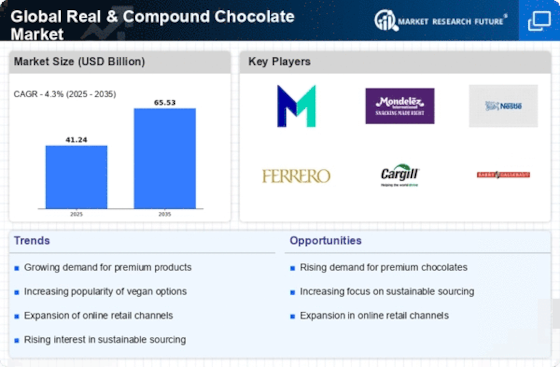
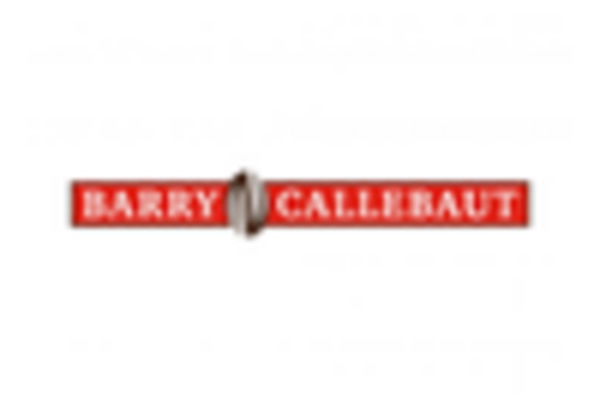
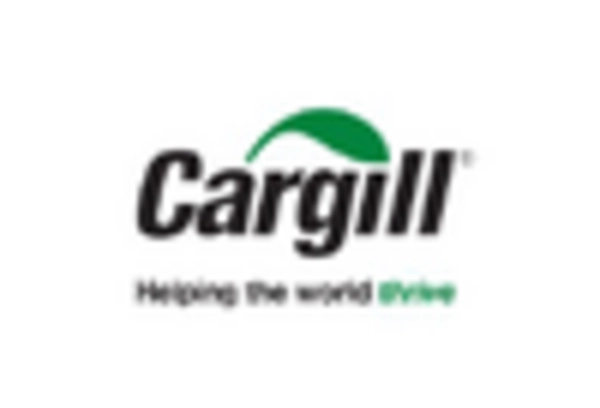
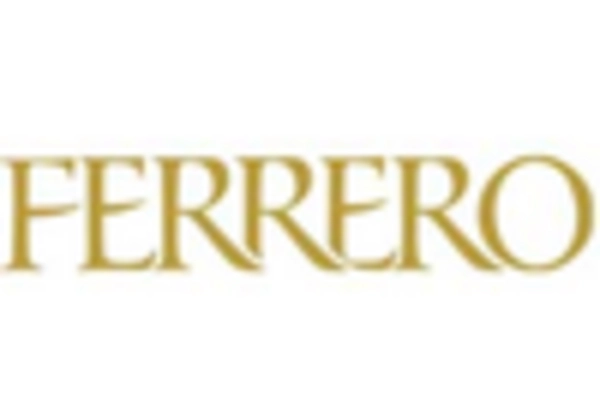

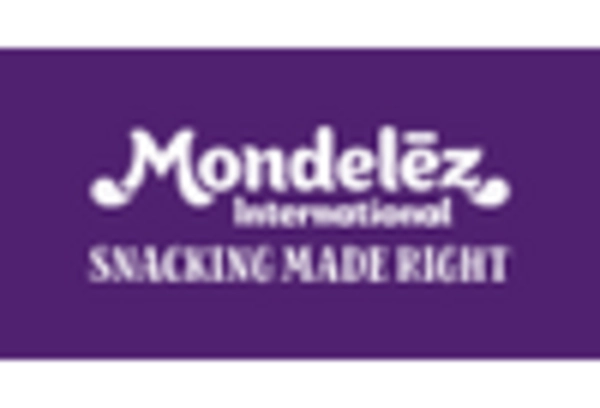
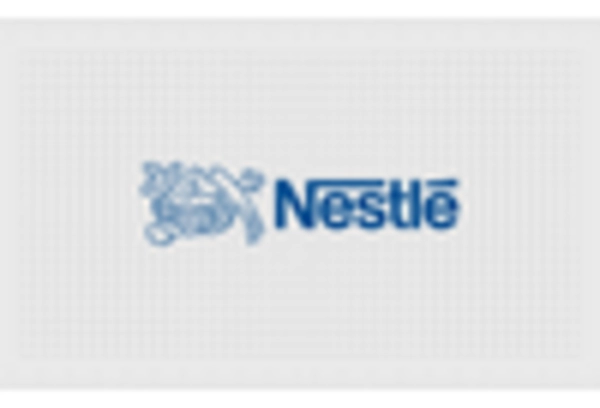









Leave a Comment